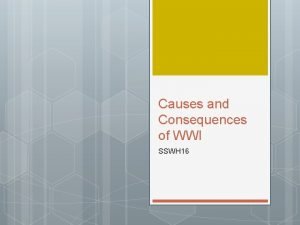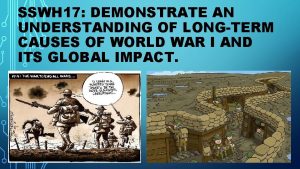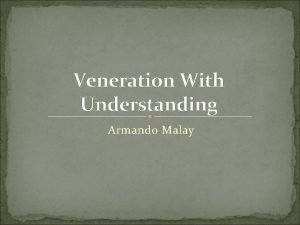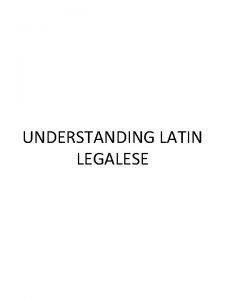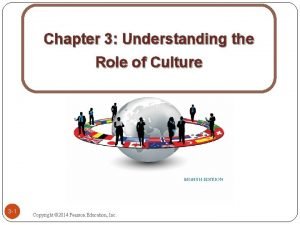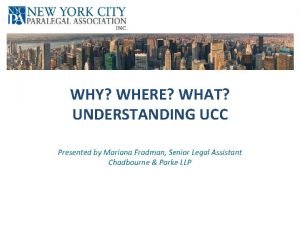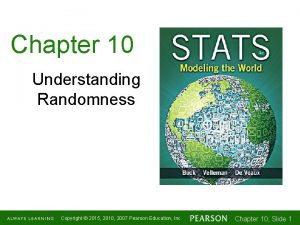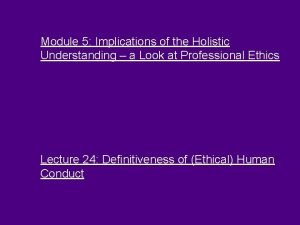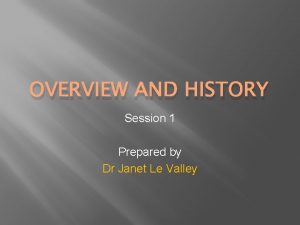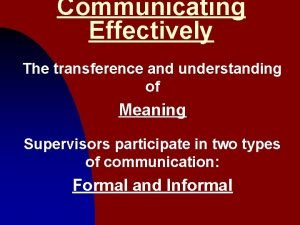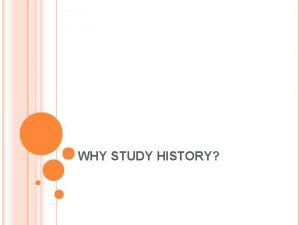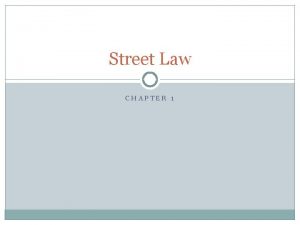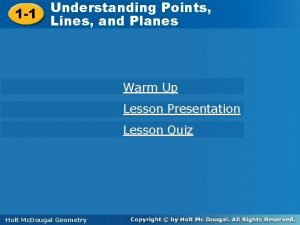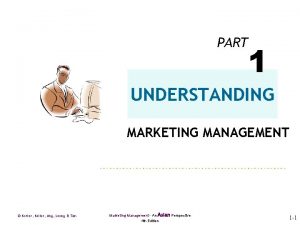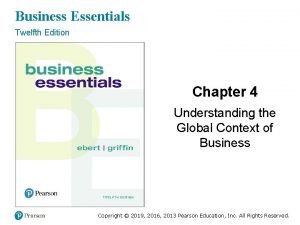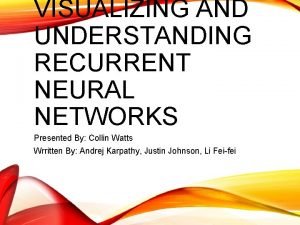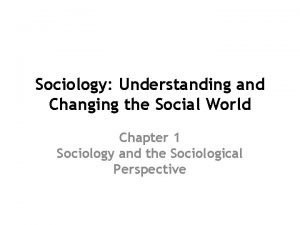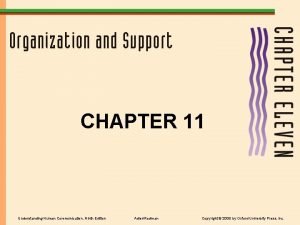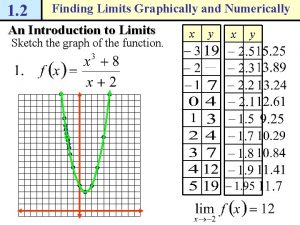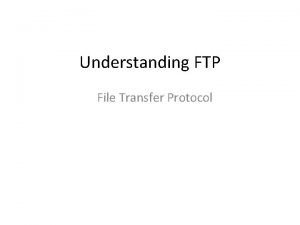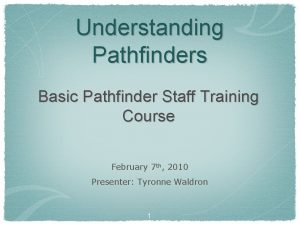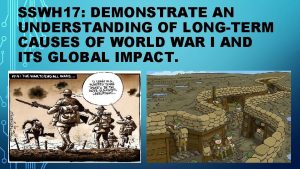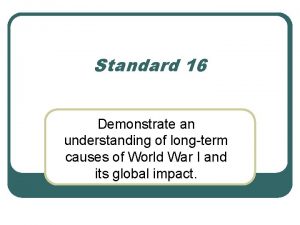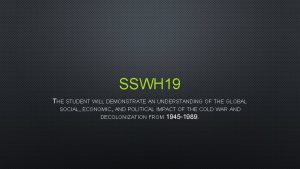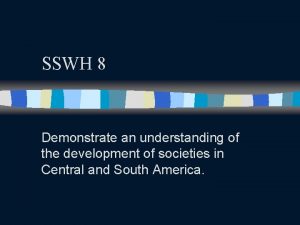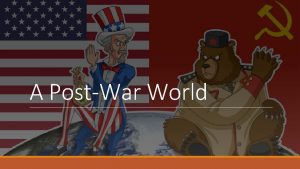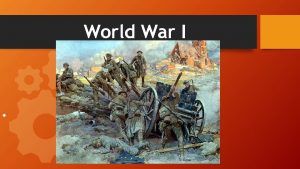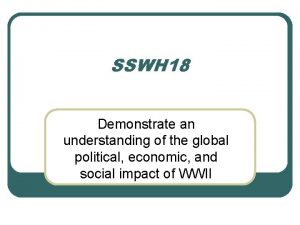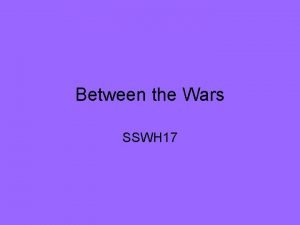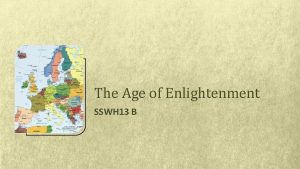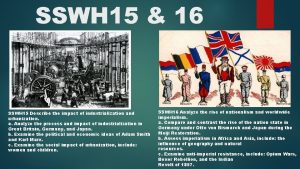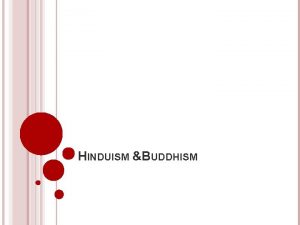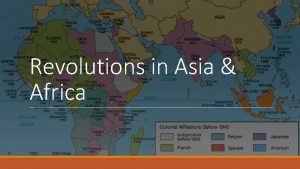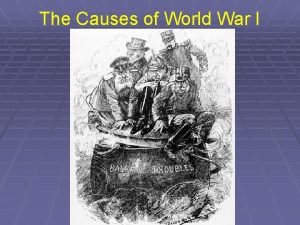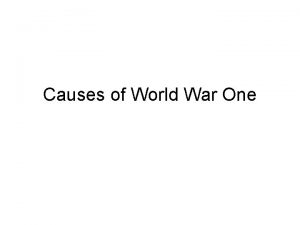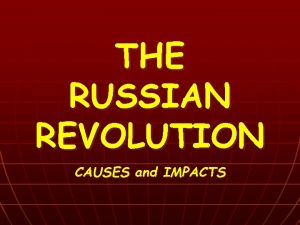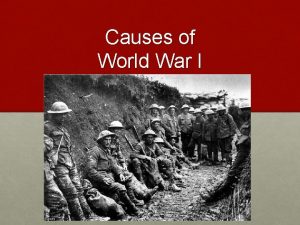SSWH 17 Demonstrate an understanding of longterm causes



































































































- Slides: 99

SSWH 17 Demonstrate an understanding of long-term causes of World War I and its global impact. a. Identify causes of the war, include: nationalism, entangling alliances, militarism, and imperialism. b. Describe conditions on the war front for soldiers, include: new technology and war tactics. c. Explain the major decisions made in the Versailles Treaty, include: German reparations and the mandate system that replaced Ottoman control. d. Analyze the destabilization of Europe in the collapse of the great empire

Road to WWI Click me!

Causes of WWI The cause of World War I was a complicated combination of factors that grew out of the European Industrial Revolution. As industrialization swept across Europe in the 19 th century so too did an insatiable demand for raw materials and new markets.

Causes of WWI These demands pushed Europe into the second phase of imperialism that culminated in the almost complete colonization of Africa, Asia, and Australia. As the Europeans scrambled to conquer territory and establish colonies they came into conflict with each other, old land based powers like the Ottomans and Russians, and new powers like the Americans and Japanese.

Causes of WWI This competition for colonies combined with the manufacturing capacity brought by industrialization led to massive military build-ups. Militarism in industrialized nations created an intense competition to outgun rivals through the mass production of the tools of war. Militarism brought instability, leading European states to form military alliances aimed at balancing the power among rival states and maintaining peace in Europe.

Causes of WWI However, these alliances tended to be secret and unstable which had the effect of intensifying competition and distrust. This intensification, competition, and distrust fostered nationalism among both the great powers of Europe and suppressed ethnic groups like the Slavs.

*Loose alliances formed Triple Alliance (1882) (Central Powers) Germany ustria Hungary taly Triple Entente (1907) (Allies) France reat Britain ussia

To provide protection and security, alliance systems were formed by European nations for mutual protection. The alliance system caused some countries to feel an obligation to aid their allies in the event of war.

Balkan Nationalism 1. The Balkans were a cluster of nations in eastern Europe, between the Austro-Hungarian and Ottoman empires. 2. Their location made the Balkans strategically important, so European powers were focused on events there. 3. The Balkans were also politically volatile, a hotbed of ethnic and nationalist tensions.


Nationalism! * European nationalism in the early 20 th century became a force for unification and division. This contradiction proved to be very dangerous as the century progressed. Growth of Nationalism presented a problem: * The German, Austro-Hungarian, Russian, and Ottoman Empires clung to lands inhabited by minority ethnic groups. * Just as the threat of foreign domination inspired nationalism among the German people in the 19 th century, in the 20 th century this same force inspired Slavic nationalism.

Nationalism! * In the early 20 th century the Slavic population of Europe was divided into a few small independent states like Serbia and larger empires like Austria. Hungary. Serbia rose as the principal advocate for Slavic unity, much like Prussia had been for German unification

Internal Problems: Socialists groups grew and were becoming violent in the strikes to achieve goals for labor movements. Being on the verge of revolution may have been a reason some leaders lunged into war in 1914

Militarism: Late 1800 s – early 1900 s -Aggressive preparation for war, build up of armies -Military leaders began to have more control than political leaders -European countries like France, Germany, Great Britain engaged in an arms race. They started building large armies and amassing weapons and tools of war began using conscription (military draft), common in most western countries (US & GB exceptions)

France and Germany doubled the size of their armies between 1890 -1940. Great Britain and Germany fought for naval dominance Introduced new battleships to the seas

Outbreak of war: : Summer 1914: *Militarism, Nationalism and desire to stifle internal dissent played a role in starting WWI. was the crisis in the Balkins in summer of 1914 led to direct conflict.

Causes of WWI M: A: I: I: N:

Serbian Problems: States wanted to free themselves from Ottoman rule, Russia and Austria-Hungry were fighting to dominate new states. 1914, with Russian support Serbia wanted to create an independent Slavic state in Balkans. The countries around the Balkans and that had control over areas in the Balkans didn't want this to happen.

*Assassination in Sarajevo June 28, 1914: Ultra-nationalist Slavic organization, the Black Hand, organized and successfully carried out the assassination of the Austro-Hungarian crown prince Archduke Franz Ferdinand. The Black Hand hoped that this assassination would weaken Austria -Hungary's hold on its Slavic territories and help create a unified Slavic state.

Archduke Francis Ferdinand (Franz Ferdinand) and his wife Sophia were visiting the Bosnian city of Sarajevo where they were assassinated by 19 year old, Gavrilo Princip, who was a member of the Black Hand.

Austria-Hungary Responds: *While Austria-Hungary knew that the Serbian government had not been directly involved in the assassination, this did not stop them from directing their anger towards Serbia.

Serbia turned to its ally Russia who promised to support them in the event of an invasion. Austria-Hungary turned to its ally Germany for help.

*Kaiser (Emperor) Wilhelm (William) II of Germany and his chancellor responded with a "blank check" and gave their full support. *On, July 28 Austria-Hungary declared war on Serbia.

Russia Mobilizes: Russia wanted to support Serbia. On July 28 Czar Nicholas II ordered partial mobilization (assembling troops and supplies) of Russian Army Against A-H. nowing Germany would consider ANY obilization an act of war on July 29 the Russian Czar declared full mobilization.

Conflict Broadens: Germany reacted quickly, Germany declared war on Russia on Aug 1. German General Alfred von Schlieffen created military plan called Schlieffen Plan. This plan called for 2 front war with Fr & Rus. According to this plan Germany would set up troops to hold Russia and carry a rapid invasion of France. Once France was defeated they would move to Russia.

Because of the Schlieffen plan on Aug 3 à Germany declared war on France Because France was an ally of Great Britain and Germany violated the neutrality agreement on Aug 4 à GB declared war on Germany (By Aug 4 th all the "great powers" were at war) Belgium tried to remain neutral

Sum UP: A series of decisions made by European leaders led to the outbreak of war Austrian-Hungary punish Serbia à Germany helps Austria-Hungary à Russia against A-H and Germany à German war against Russia & France à Great Britain declares war on Germany

Describe conditions on the war front for soldiers, include: new technology and war tactics Click me!!

Between 1914 & 1915: -Governments tried to influence public opinion for or against the cause called propaganda, (ideas spread to influence public opinion for or against a cause) able to convince people that their nations cause was just.

-People also believed that the war would be over in a few weeks “The boys will be home by Christmas” since before this all other European wars had ended in a matter of weeks.

Click Me! (both)

Lets do a Propaganda Project! : )

Fronts of War World War I was fought on two principal fronts: the western front, between France and Germany, and the eastern front, between Russia and Germany. There was also a series of conflict at sea between the British and Germany.

Western Front: German hopes for a quick war rested on the Schlieffen Plan. Germany attempted to encircle France through Belgium. Germany's plan was to sweep through Paris to try & surround the French army.

German advancement was halted at the first Battle of Marne, Sept 6 -10 the battle became a stalemate and began trench warfare.

The front was a 500 -mile long network for trenches, bunkers, minefields, machine gun nests, and artillery that ran from Switzerland to the English Channel. The Western Front epitomized both the success and failure of early 20 th century industrialized warfare. The mass production of weapons and ammunition made defensive positions easy to hold but weak transportation technology made offense difficult.


As a result, the Western Front was generally a stalemate on which opposing armies hurled metal and poison gas at each other; this resulted in massive casualties on both sides but few territorial gains. Essentially kept both sides in same positions for 4 years.


Click me!!



Life on the Western Front for soldiers was quite horrible. Soldiers were confined to trenches and underground bunkers by the constant threat of artillery, gunfire and poison gas. Trenches were muddy leading to chronic foot infections known as trench foot, serious cases could lead to amputations. Vermin were everywhere and disease was common

Eastern Front: Eastern Front marked by mobility, cost in lives was huge! Fighting along the Eastern Front demonstrated the superiority of highly industrialized nations over their less industrialized counterparts. By 1914, Germany was an industrial powerhouse, however Russia was only an early phase of industrialization.

As a result, Germany dominated the Eastern Front and Russia was only able to hold off German forces with superior manpower and support from their allies. In the end, Germany's domination of the Eastern Front led to a revolution in Russia and Russia's subsequent withdraw from the war in 1917.

Austria-Hungary was not faring well, either, as they were losing to Russia. This forced Germany to jump to the defense of A-H and spread their army out. Germany was also betrayed by Italy who flipped sides and joined the Allies in May of 1915.

1916 -1917: Great Slaughter By 1916 trenches became elaborate systems for defense. he lines were protected by barbed wire up to 5 feet high and 30 yards wide, concrete blocks supported artillery. roops lived in holes in-ground and the trenches were separated from each other by no-man's land.

Trench Warfare Tactics: Trench warfare baffled military leaders. They were used to fighting by movement and maneuvers. They just kept trying to break through the lines thinking t eventually they would return to the style of fi they knew best.

hey would try to bomb the trenches and flatten the barbed wire then send the soldiers with their bayonets to work their way to the enemy trenches. The attacks rarely worked because they had to advance through no-mans land where they were unprotected and would be mowed down by machine guns. Terrible conditions existed in the trenches as well.

Millions died trying to breakthrough Battle of Verdun in France, February-December 1916 (10 months) seven hundred thousand died over a few miles of land. The only real effect of the battle was the irrevocable wounding of both armies. No tactical or strategic advantage had been gained by either side. WWI was now a war of attrition, trying to wear the other side down by constant attacks and heavy losses.

War in the Air: By 1915 airplanes became important on battlefront. At first they were used to locate the enemy. They soon began to attack ground targets though. In the beginning they shot at each other with hand-held pistols, later machine guns. Germans used zeppelins to bomb London & Eastern England (figured out they were filled with hydrogen and started shooting them down)


Widening the War: Both sides wanted more allies to provide winning advantage. Ottoman Empire joined the war on the side of Germany in Aug of 1914, so allies declared war on them. Allies attacked Gallipoli in April 1915, however Bulgaria entered on the Central powers side forcing allies to withdraw.

Allies promised Italy some land in Austria for switching sides. In the Middle East, British officer Lawrence of Arabia, in 1917, urged Arab princes to revolt against Ottoman overlords. In 1918, British forces from Egypt destroyed Ottoman empires. British mobilized forces from India, Australia and New Zealand. Japan helped take German areas in the Pacific.

US Entry: US wanted to remain neutral but it became hard to do so. ritain had a naval blockade of Germany to prevent goods from getting to Germany, so Germany set up a blockade against Great Britain. ermany enforced their blockade with unrestricted submarine warfare.

On May 7 1915, there was the sinking of Lusitania which killed 1, 100 civilians (100 Americans) by German forces with their unrestricted submarine warfare. A combination of the unrestricted submarine warfare and The Zimmerman note caused the US to enter war


Home Front Impact: Increased government powers --> to meet needs of the long war many governments increased their power. Examples: Drafting tens of millions of young men, free markets put on hold (meaning govt sets price, wage, rent controls, rationed food an materials, regulated imports and exports, took over transportati and set up planned economies (systems directed by gvt agencies)

Increased Government Power Continued: Under conditions of total war mobilization, the differences between solider's at war and civilians was narrowed US President Woodrow Wilson said that "men and women who stay at home to till the soil and man the factories are no less part of the army than the men beneath the battle flags"

Women's Roles -Women took over jobs previously held by men that before the war had been considered beyond their capacity. For example: chimney sweeps, truck drivers, farm labor, factory worker in heavy industry. -At the end of the war gvts removed women from these jobs, if they were able to stay and work their wages were lowered

-Did have an impact on the women's movement for social and political emancipation. -Women were given the right to vote in Germany, Austria and US right after the war, most British women could vote by 1918. *Edith Cavell


The Russian Revolution: Rasputin Romanov Family Click Me!

à ussia was unprepared for the war and Czar Nicholas II demanded he take control of armed forces personally (although he lacked training). à Russia's army was unable to make the necessary weaponry and many soldiers trained using broomsticks.

Others were sent to fight without a weapon and told to pick one up off a dead comrade. à Between 1914 -1916, 2 million soldiers killed, another 4 -6 million wounded or captured. à By 1917 Russian will to fight was gone.

à Czar Nicholas was an autocratic ruler who relied on his army and bureaucracy to hold up the regime. à Czar Nicholas II's wife Alexandria (who was German born) fell under the influence of Grigori Rasputin.

She relied heavily on him for decisions b/c she thought he was a holy man since he could stop the bleeding of Alexis (who had hemophilia) àPeople were upset at the Monarchy and decided to assassinate Rasputin (difficult to do) in Dec 1916 they did. ***You do not have to write the next slides about Rasputin's death***

The date of Rasputin’s death is variously recorded as being either 17 th December 1916 or the 29 th December 1916. What is known is that having decided that Rasputin's influence over the Tsarina had made him a threat to the empire, a group of nobles led by Prince Felix Yusupov, and Vladimir Purishkevich apparently lured Rasputin to the Yusupovs' Moika Palace by intimating that Yusupov's wife, Princess Irina, would be present and receiving friends. The group led him down to the cellar, where they served him cakes and red wine laced with a large amount of cyanide. According to legend, Rasputin was unaffected, although Vasily Maklakov had supplied enough poison to kill five men. Determined to finish the job, Prince Yusupov became anxious about the possibility that Rasputin might live until the morning, leaving the conspirators no time to conceal his body. Yusupov ran upstairs to consult the others and then came back down to shoot Rasputin through the back with a revolver. Rasputin fell, and the company left the palace for a while. Yusupov, who had left without coat, decided to return to get one, and while at the palace, he went to check on the body. Suddenly, Rasputin opened his eyes and lunged at Yusupov. He grabbed Yusupov and attempted to strangle him. At that moment, however, the other conspirators arrived and fired at Rasputin. After being hit three times in the back, he fell once more. As they neared his body, the party found that, remarkably, he was still alive, struggling to get up. They clubbed him into submission. Aft binding his body and wrapping him in a carpet, they threw him into the icy Neva River. He broke out of his bonds and the carpet wrapping him, but drowned in the river.

Three days later, Rasputin's body, poisoned, shot four times, badly beaten, and drowned, was recovered from the river. An autopsy established that the cause of death was drowning. It was found that he had indeed been poisoned, and that the poison alone should have been enough to kill him. There is a report that after his body was recovered, water was found in the lungs, supporting the idea that he was still alive before submersion into the partially frozen river. Subsequently, the Tsarina Alexandra buried Rasputin's body in the grounds of Tsarskoye Selo, but after the February Revolution, a group of workers from Saint Petersburg uncovered the remains, carried them into the nearby woods, and burned them. As the body was being burned, Rasputin appeared to sit up in the fire. His apparent attempts to move and get up thoroughly horrified bystanders. The effect can probably be attributed to improper cremation since the body was in inexperienced hands, the tendons were probably not cut before burning. Consequently, when the body was heated, the tendons shrank, forcing the legs to bend and the body to bend at the waist, resulting in its appearing to sit up. This final happenstance only further fueled the legends and mysteries surrounding Rasputin, which continue to live on long after his death.

March Revolution: . - A series of strikes by working class women broke out in Petrograd (formerly St. Petersburg). -Govt had started bread rationing after the price sky rocketed(standing in line caused people to be late for work) Strikes shut down factories and on March 10 the Czar ordered the troops out, kill if necessary, but many soldiers joined demonstrators instead. The Duma which Alexander had tried to dissolve met anyway. -They set up a provisional government and urged the Czar to step down. Czar sees he has lost control and steps down ending the 300 year Romanov dynasty. -

-The provisional government is headed by Alexander Kerensky who decided to keep Russia in WWI to preserve their honor. -This was a major blunder that made the workers and the peasants angry since they are tired from years of suffering and fighting. They wanted above all to end the war. -New soviet groups (councils of workers and soldiers) form. The soviets are largely made up of socialists and represent the more radical interests of the lower classes à most important Bolsheviks

Alexander Kerensky Lenin

Rise of Lenin: ØBolsheviks began as a small Marxist group called the Russian Social Democrats. ØBolsheviks, under leadership of Vladimir Ilyich Ulianov (better known as V. I. Lenin), become a violent revolutionary group who want to destroy capitalism.

ØBetween 1900 -1917 Lenin was abroad. In March 1917 he saw an opportunity to take over with the Bolshevik party. ØApril 1917 German military leaders, hoping to create disorder in Russia, sent Lenin there (in a private “sealed” train car so his ideas could not infect Germany)

Ø enin wanted to gain control of the peasants, workers and soldiers in order to overthrow the provisional government. ØThe Bolsheviks represented the discontent of the people (they promised to end war, redistribute land, transfer control of factories from capitalist to committee and government power from provisional to soviets)

Ø olsheviks take over in November 1918 and rename themselves The Communists Ø n March 3, 1918 Lenin signed Treaty of Brest-Litovsk w/Germany giving up Russian lands in Poland, Ukraine, Finland the Bal Provinces. Ø e thought that as the socialist revolution spread it would make the treaty largely irrelevant.

Civil War in Russia v. Many people opposed the Bolshevik reign (including those loy to the Czar and liberals). These groups are joined by the Allies who are afraid of the spread of communism and send troops and supplies to anti-communist Russian groups. v. The communist (Red) Army fought against the anti-communist (White) force between 1918 and 1921.

The first of the serious threats came from Serbia where the white force advanced westward. Attacks also came from Ukraine where they pushed all the way to Moscow. v. By 1920, however, the Red army had defeated almost all of the White forces and retaken the land. v. The royal family became another victim of the civil war. The family had been moved to a small mining town in the Urals (mountains) and held captive there. On the night of July 16 the Czar and his family were murdered, by the local soviet, and their bodies were burned in a nearby mine shaft.

How Did Communism Triumph? . 1. an named Leon Trotsky acted as commissar of war and had very disciplined soldiers. Any who disobeyed or deserted were shot on the spot. . 2. hite forces were not united in the goal of winning (some want monarchy some democracy) where the Red group had a singleminded sense of purpose. . 3. ed secret police (Cheka) began Red Terror, similar to Reign of Terror, killing all who opposed communism

4. They also instituted War Communism à govt has control over banks, industries seizing of grain from peasants and centralization of state control to Communist regime 5. y 1921 à Total command, hostile toward allies b/c allies tried to help anti-communists in their Civil War

The Red Scare After the Russian Revolution, fear of a similar revolution in the United States by communists from Russia led to a period known as the Red Scare. Attempted assassinations of Attorney General Mitchell Palmer and John D. Rockefeller led to the Palmer Raids—in which suspected communists were arrested and more than 500 immigrants deported. This led to increase fear of immigrants and restrictions on immigration were passed by Congress.

End of the War The three most important men at the Versailles Conference ‘the Big Three’ - were: Georges Clemenceau, the Prime Minister of France (2 nd right). Woodrow Wilson, the President of America (far right). David Lloyd George, the Prime Minister of Britain (far left, talking to Orlando, the Prime Minister of Italy). Click me!!

Last Year of the War: 1917: Bad for allies, Russia’s Civil War led to them withdrawing from war, they were being beaten badly on Western front. he Central Powers (Triple Alliance) seem to have momentum, but the U. S. joining give Allies (Triple Entente) psychological boost along with men and materials they needed to win.

German Offensive: ^Without Russia, Germany has hope of winning, since they can now concentrate on the Western front. . ^Erich von Ludendorff, (military leader for Germany) began to attack and were able to push German troops within 50 miles of Paris. . On July 18, 1918 at what became the Second Battle of Marne.

France, Moroccan and American troops (140, 000 fresh American troops who had just arrived) pushed back the German troops. On September 29, 1918 Ludendorff tells German leaders the war was lost and demanded that govt ask for peace at once.

Collapse and Armistice: § ermany collapses into itself with angry soldiers and workers taking over civilian and military offices. They just want the war to be over. §William II gives into pressure and flees Germany on November 9 th. §New Social Democrats emerge under Friedrich Ebert and on the 11 th hour of the 11 th day of the 11 th month of 1918 Germany agreed to cease-fire and signed an armistice (truce) to end the fighting.

Revolutionary Forces: àGermany Communist parties emerge in December of 1918 and attempt to take over. àThey were stopped but left a deep fear of communism among the middle class. àAustria-Hungary à becomes independent republics. . . Austria, Hungary, Czechoslovakia, and Yugoslavia. à Their rivalries with each other left Eastern Europe weak for the next 80 years.

Peace Settlements: o Woodrow Wilson’s: “Fourteen Points”- Biggest was he wanted a League of nations. o. Paris Peace Conference: delegates met in early 1919 to determine peace settlements. . o Many problems became obvious, like secret peace treaties and agreements people made for territorial gains. o Georges Clemencau- France, HATED Germany

President Woodrow Wilson and 14 Points 1. No more secret agreements ("Open covenants openly arrived at"). 2. Free navigation of all seas.

Wilson and 14 Points Continued. . . 8. France should be fully liberated and allowed to recover Alsace-Lorraine 14. A League of Nations should be set up to guarantee the political and territorial independence of all states.

What is the most significant piece of the 14 points according to Wilson? January 8 th, 1918 Wilson's 14 Points The President of the United States of America, Woodrow Wilson, in his message on the Conditions of Peace delivered at a Joint Session of the Two Houses of the American Congress, identifies the "fourteen points" intended to serve as the basis for world peace. Point 14 says: "A general association of nations should be formed on the basis of covenants designed to create mutual guarantees of the political independence and territorial integrity of States, large and small equally. "

Problems: o. David Lloyd George, GB, wanted Ger to pay o. Georges Clemenceau, Fr, wanted revenge and security against Germany. o"The Big Three": Wilson (US), Lloyd George (GB) and Clemenceau (Fr) ran the peace settlement, Italy (who had switched to the entente at the end) didn’t get much say, Russia was having its Civil War couldn’t be there, and Ger wasn’t allowed! o. League of Nations, world organization, created to help prevent war again

Treaty of Versailles: v. Germans were unhappy about treaty, especially the War Guilt Clause. v. They had to reduce their army and navy and eliminate air force. v. Alsace and Loraine taken from France in 1871 given back. Polish state established in East Germany. v. Germans were outraged but didn't want to renew war so signed treaty.

What country saw the Treaty of Versailles as unfair? Why? Perhaps the most humiliating portion of the treaty for the defeated Germany was Article 231, commonly known as the "War Guilt Clause, " which forced Germany to accept complete responsibility for initiating World War I. As such Germany was liable for all material damages, and France's premier Georges Clemenceau particularly insisted on imposing enormous reparation payments.


New boundaries were drawn for Europe. Click me!

War’s Legacy: -WWI was the bloodiest war in history a the time. 22 million people died new insecurities emerged among nations and freedoms were limited

And DONE!!

Attachments World_War_I (2). asf Realities_of_War__The_Trenches__Weapons__and_Death. asf Committee_on_Public_Information__Propaganda_Agency. asf Life In The Trenches Of WWI. mp 4 The Trenches. mp 4 Sinking_of_the_Lusitania_and_the_Zimmerman_Telegram. asf Romanov_Dynasty. asf Treaty_of_Versailles__An_Unsettling_Peace__1918_. asf 1918__Americans_Arrive_Just_in_Time. asf Communism_and_the_Soviet_Union. asf
 Sswh
Sswh Sswh tax meaning
Sswh tax meaning Sri lanka and tamil nadu map
Sri lanka and tamil nadu map Linux kernel longterm
Linux kernel longterm Thomas silverstein
Thomas silverstein Demonstrate knowledge and understanding
Demonstrate knowledge and understanding Ultimate vs proximate causation
Ultimate vs proximate causation Proximate and ultimate causes of behaviour
Proximate and ultimate causes of behaviour What does this image demonstrate?
What does this image demonstrate? Demonstrate
Demonstrate Demonstrate speech
Demonstrate speech Demonstrate synony
Demonstrate synony Contest at mt carmel
Contest at mt carmel What happened in chapter 11 of touching spirit bear
What happened in chapter 11 of touching spirit bear Miller and urey's experiments attempted to demonstrate
Miller and urey's experiments attempted to demonstrate Demonstrate
Demonstrate Imbricate
Imbricate Edip teaching
Edip teaching Demonstrate
Demonstrate Medulla structure
Medulla structure 13 personal care skills
13 personal care skills Demonstrate
Demonstrate Demonstrative definition
Demonstrative definition Bicultural couples tend to demonstrate extremes in
Bicultural couples tend to demonstrate extremes in Demonstrate
Demonstrate Demonstrate good subject and curriculum knowledge
Demonstrate good subject and curriculum knowledge Demonstrate rhyme
Demonstrate rhyme Demonstrate two
Demonstrate two Demonstrate your ability
Demonstrate your ability How to calculate standard deviation
How to calculate standard deviation Knowledge process understanding
Knowledge process understanding Harmony in nature and existence
Harmony in nature and existence Ways of enriching the bible understanding
Ways of enriching the bible understanding Deepening understanding year 5
Deepening understanding year 5 Understanding your business finances
Understanding your business finances Annotation slows down the reader to deepen understanding
Annotation slows down the reader to deepen understanding Understanding the scriptures chapter 20 study questions
Understanding the scriptures chapter 20 study questions Veneration without understanding
Veneration without understanding Bitwit separation
Bitwit separation Understanding buyers
Understanding buyers Understanding the problem space
Understanding the problem space Introduction to binary numbers
Introduction to binary numbers Fiscal policy meaning
Fiscal policy meaning Understanding the role of culture
Understanding the role of culture Pricing: understanding and capturing customer value
Pricing: understanding and capturing customer value Understanding the ucc
Understanding the ucc Understanding serps
Understanding serps Chapter 1 understanding health and wellness
Chapter 1 understanding health and wellness The process of evaluating and regulating ongoing activities
The process of evaluating and regulating ongoing activities Understanding certificates of insurance
Understanding certificates of insurance Understanding standards advanced higher english
Understanding standards advanced higher english Fedcb
Fedcb Understanding randomness chapter 10
Understanding randomness chapter 10 Google drive
Google drive Section 1 understanding our environment answer key
Section 1 understanding our environment answer key Overregularization demonstrates a child's understanding of
Overregularization demonstrates a child's understanding of Understanding statistics and experimental design
Understanding statistics and experimental design Understanding population pyramids
Understanding population pyramids Www.irs.gov/app/understanding taxes/student/simulations.jsp
Www.irs.gov/app/understanding taxes/student/simulations.jsp Understanding civility and cultural competence
Understanding civility and cultural competence Definitiveness of ethical human conduct is also known as
Definitiveness of ethical human conduct is also known as Meaning of international understanding
Meaning of international understanding Transference and the understanding of meaning
Transference and the understanding of meaning Cribmaster
Cribmaster It helps us understand people and society
It helps us understand people and society Advanced higher art understanding standards
Advanced higher art understanding standards Chapter 1 activity understanding street law
Chapter 1 activity understanding street law Interconnectedness and mutual fulfillment in nature
Interconnectedness and mutual fulfillment in nature Understanding latitude and longitude
Understanding latitude and longitude Poems about understanding others
Poems about understanding others Ece 355 understanding behavior & family dynamics
Ece 355 understanding behavior & family dynamics Types of printers
Types of printers Pamantayang pagganap sa filipino
Pamantayang pagganap sa filipino Understanding mobility based on gps data
Understanding mobility based on gps data Understanding diversity
Understanding diversity Understanding data and ways to systematically collect data
Understanding data and ways to systematically collect data Metric system of measurement
Metric system of measurement Understand quran and salah the easy way
Understand quran and salah the easy way Lesson 1-1 understanding points lines and planes
Lesson 1-1 understanding points lines and planes Keller
Keller Network traffic characteristics
Network traffic characteristics Business essentials 12th edition free
Business essentials 12th edition free Biological basis for understanding psychopharmacology
Biological basis for understanding psychopharmacology Visualizing and understanding recurrent networks
Visualizing and understanding recurrent networks Understanding relational databases
Understanding relational databases Understanding foodservice operations chapter 2
Understanding foodservice operations chapter 2 How to understand scale drawings
How to understand scale drawings Higher business questions
Higher business questions Sociology: understanding and changing the social world
Sociology: understanding and changing the social world Understanding human communication 14th edition
Understanding human communication 14th edition Understanding canadian business
Understanding canadian business What are enduring understandings
What are enduring understandings Finding limits graphically and numerically
Finding limits graphically and numerically How to find ionization constant for water potential
How to find ionization constant for water potential Understanding ftp
Understanding ftp Lesson outline lesson 1: understanding science answer key
Lesson outline lesson 1: understanding science answer key Chapter 1 lesson 2 what affects your health
Chapter 1 lesson 2 what affects your health Understanding pathfinders
Understanding pathfinders Disability introduction
Disability introduction Understanding trans health
Understanding trans health
